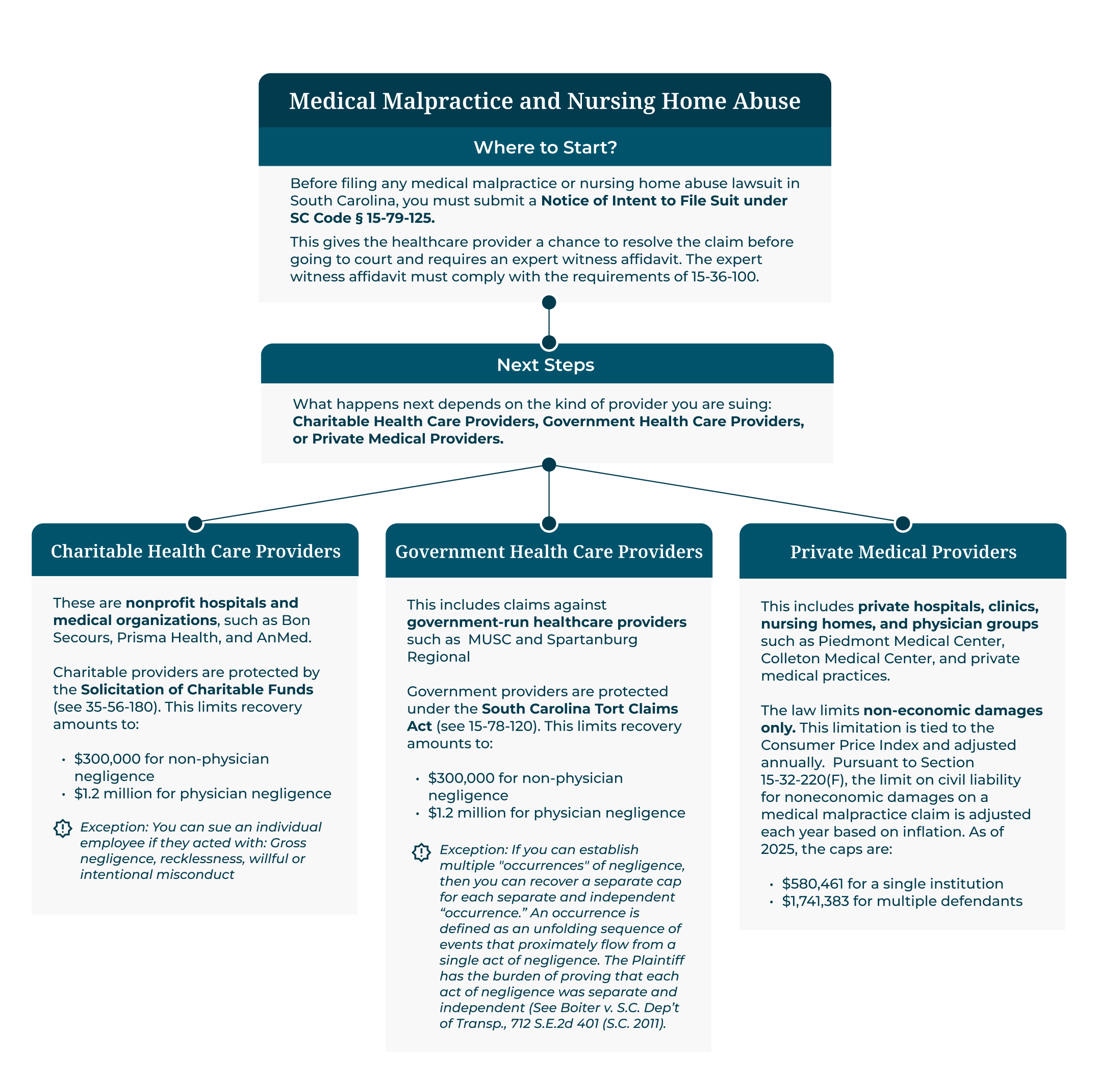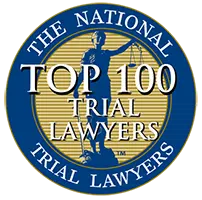A medical malpractice lawsuit begins with identifying how medical care providers failed to meet reasonable healthcare standards, resulting in harm to a patient. The injured person provides notice of their intent to file a lawsuit. If the claim can’t be resolved with pre-suit mediation, the plaintiff files a legal claim. The parties litigate the claim through discovery and preliminary legal procedures. If they do not resolve the case through settlement, the case may proceed to trial.
Experienced Greenville medical malpractice lawyer Bobby Jones explains how medical malpractice works in South Carolina.

What Qualifies as Medical Malpractice in South Carolina?
Medical malpractice in South Carolina occurs when a healthcare provider fails to provide adequate medical care. A healthcare provider must give professional care and meet acceptable standards in the following:
- Training
- Skill
- Attention
- Judgment
- Timeliness
- Sanitation
- Methods
- Communication
An act or failure to act may qualify as medical malpractice. It can be failing to do what a reasonable healthcare provider would have done or doing what a reasonable healthcare provider would not have done.
Medical malpractice: Failing to meet professional standards
The standard isn’t necessarily anticipating every outcome or providing perfect services. Rather, it’s that people have the right to expect competence when they receive medical care. Failing to meet the professional standard because of an error or omission is medical malpractice.
Many roles can be named as parties responsible for medical malpractice.
- Doctor
- Nurse, RN, nurse practitioner
- Physician’s assistant
- Surgeon, anesthesiologist
- General or specialized practice physician
- Dentist
- Chiropractor
- Home health nurse
- Emergency care and urgent care providers
- Pharmacist
- Family care doctors and nurses
Medical malpractice is specific to healthcare, rather than general personal injury. If a claim doesn’t fall under medical malpractice, it may be a general negligence claim. A legal claim may allege medical malpractice and general negligence.
Common Types of Medical Malpractice Claims
Here are examples of common medical malpractice claims.
- A healthcare provider doesn’t have the training or skill for the procedure they perform.
- Symptoms should be recognizable as a serious medical condition, but if a doctor fails to identify it, the diagnosis is delayed.
- Lack of medical training leads to the wrong diagnosis and inappropriate care.
- Failure to monitor the mother and child during labor results in a birth injury.
- A surgeon leaves a sponge, clamp, or other surgical instrument in the body.
- Lab results are misinterpreted, leaving someone without the care they need.
- When filling a prescription, the patient receives the wrong medication.
- Drug interactions are not recognized, and harm occurs.
- Anesthesia errors result in a loss of oxygen.
- The doctor doesn’t fully explain the risks of a procedure.
The Role of the Notice of Intent and Expert Affidavit in SC
Medical malpractice claims in South Carolina work slightly differently from other personal injury claims. The case must begin with a Notice of Intent to File Suit.
This is a formal notice given to the defense that must meet specific requirements, including an affidavit from an expert witness. The Notice must also include standard interrogatories and disclosures required under legal procedure rules. Once the Notice of Intent is filed and served, named parties may subpoena records and, with leave, take depositions.
The role of the Notice of Intent and expert affidavit is to facilitate the fast resolution of a medical malpractice claim. The defense receives a summary of the case, including the facts and the plaintiff’s demand for compensation. This can help them summarily review the claim.
The role of the Notice of Intent and expert affidavit is to facilitate the fast resolution of a medical malpractice claim. Ninety to 120 days after the Notice of Intent is served, the parties must engage in mediation. Sometimes, these early procedures can resolve the case without formal legal proceedings.
Steps in a South Carolina Medical Malpractice Lawsuit
A South Carolina medical malpractice lawsuit works through the following steps:
- Investigation. The plaintiff evaluates the case to determine what medical malpractice occurred and who is responsible.
- Notice of Intent to File Suit. The plaintiff serves each defendant with their Notice of Intent to bring a claim for medical malpractice.
- Preliminary Proceedings. The parties engage in preliminary discovery and mediation.
- Case Filing. If the case doesn’t resolve at the preliminary phase, the plaintiff files a summons and complaint to take the case to court.
- Pretrial Procedures. The parties participate in discovery, case status hearings, and preliminary motions.
- Case Resolution. Additional mediation and settlement negotiations will likely take place.
- Settlement or Trial. The parties may resolve the case by settlement. If they don’t, the plaintiff may take their case to trial, which involves the presentation of evidence and arguments so that the jury or judge can determine liability.
- Post-Judgment Matters. After the judgment is determined, there may be post-judgment steps like an appeal or collecting compensation.
Not every medical malpractice lawsuit works the same way. The steps will vary based on the specifics of the case and your legal strategy.
South Carolina’s Medical Malpractice Statute of Limitations
A person injured by medical malpractice has a limited amount of time to seek compensation. The general limit is three years, but there are some important exceptions, including a shorter time limit when a medical institution is funded by the state. Don’t wait to contact a lawyer.
Learn more about the South Carolina medical malpractice statute of limitations.
What Evidence Is Needed To Prove Medical Negligence?
Evidence needed to prove medical malpractice must include medical information. This is usually a physician who reviews the case.
Additional evidence may include fact witnesses, medical records, and compensation information.
How Settlements and Trial Verdicts Are Handled
A settlement or a trial verdict becomes a court order for the responsible party to pay compensation.
Note: South Carolina caps damages in medical malpractice claims. Learn more about limits on damages in South Carolina medical malpractice cases.
Contact an Experienced Greenville Medical Malpractice Abuse Lawyer
If you’ve been hurt by poor medical care, you need to know how a medical malpractice lawsuit works. Robert “Bobby” Jones of Bobby Jones Law is an experienced and accomplished injury lawyer, handling medical malpractice claims. Call or message us now.



















